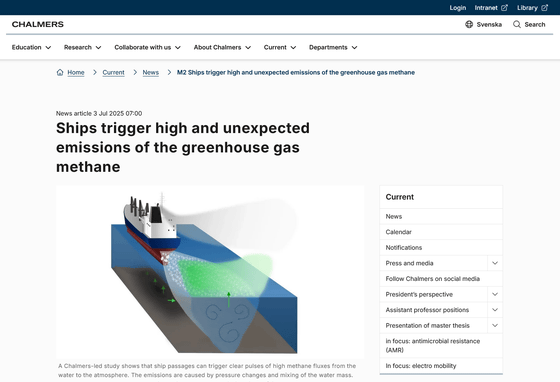It turns out that ships sailing in shallow waters are responsible for massive emissions of the greenhouse gas methane

A study led by Sweden's Chalmers University of Technology found that ships operating in shallow waters are likely responsible for large amounts of methane emissions from the seafloor.
Coastal methane emissions triggered by ship passages | Communications Earth & Environment
Ships trigger high and unexpected emissions of the greenhouse gas methane | Chalmers
https://www.chalmers.se/en/current/news/m2-ships-trigger-high-and-unexpected-emissions-of-the-greenhouse-gas-methane/

Shipping traffic can trigger methane emissions from seafloor, study finds - The Washington Post
https://www.washingtonpost.com/science/2025/07/12/seafloor-ships-methane-greenhouse-emissions/
According to a study by Chalmers University of Technology and other researchers, methane trapped in sediments on the ocean floor is released in large quantities due to pressure changes and turbulent mixing caused by ship traffic. Compared to nearby, unruffled waters, methane emissions in the shipping lane were 20 times higher in shallow waters where ships pass.
Methane is a greenhouse gas 27 times more potent than carbon dioxide, but emissions from the ocean floor are often overlooked by current measurement methods, the researchers point out.
The researchers found that the methane emissions from car ferries were higher than those from larger cargo ships, as well as from cruise ships and container ships. Ricardo Bensou, a professor of fluid mechanics at Chalmers University of Technology and the team's lead modeler of ship traffic, said the reason car ferries emitted more methane than larger cargo ships was because they have dual propellers.
The discovery was made by chance during another survey in the Neva Bay in the Baltic Sea near St. Petersburg.
'Our findings highlight a previously unknown influence of shipping which could have significant global implications, especially given the concentration of ports in shallow waters,' said Professor Johan Melqvist from Chalmers University of Technology and co-author of the paper.
'The next step is to estimate how large these impacts will be globally,' said Ida-Maya Hasselöf, professor of maritime and environmental sciences at Chalmers University of Technology. 'Major ports in China, Singapore and South Korea, as well as ports such as Rotterdam, Antwerp and the German river system, have environments similar to the Neva Gulf. There too, methane emissions are very likely underestimated.'
Related Posts:







